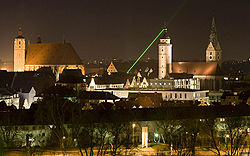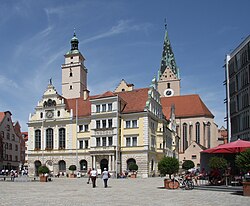Ingolstadt
Ingolstadt (US: /ˈɪŋɡəlʃtɑːt, -stɑːt/ ING-gəl-s(h)taht,[2] German: [ˈʔɪŋɡɔlˌʃtat] (![]() listen); Bavarian: Inglstod [ˈʔɪŋl̩ʃtɔːd] or Ingoistod, Latin: Auripolis) is a city in the German state of Bavaria near Munich. It is on the Danube river and has about 127,000 inhabitants.
listen); Bavarian: Inglstod [ˈʔɪŋl̩ʃtɔːd] or Ingoistod, Latin: Auripolis) is a city in the German state of Bavaria near Munich. It is on the Danube river and has about 127,000 inhabitants.
 | |
Location of Ingolstadt
Lua error in Module:Infobox_mapframe at line 118: attempt to index field 'wikibase' (a nil value).
| |
| Coordinates: 48°46′N 11°26′E / 48.767°N 11.433°ECoordinates: 48°46′N 11°26′E / 48.767°N 11.433°E | |
| Country | Germany |
| State | Bavaria |
| Admin. region | Upper Bavaria |
| District | Urban district |
| Subdivisions | 11 Stadtbezirke with 61 Unterbezirken |
| Government | |
| • Lord mayor | Christian Lösel (CSU) |
| Area | |
| • Total | 133.37 km2 (51.49 sq mi) |
| Elevation | 374 m (1,227 ft) |
| Population (2016-12-31)[1] | |
| • Total | 133,639 |
| • Density | 1,002.02/km2 (2,595.21/sq mi) |
| Time zone | UTC+01:00 (CET) |
| • Summer (DST) | UTC+02:00 (CEST) |
| Postal codes | 85049–85057 |
| Vehicle registration | IN |
| Website | www |
History
In 1472, Bavaria's first university was founded in Ingolstadt. The Bavarian Reinheitsgebot, a regulation about the purity of beer, was started there in 1516. The car manufacturer Audi has its main base in Ingolstadt.
Ingolstadt is also the setting of Mary Shelley's famous novel Frankenstein.
Ingolstadt Media
Siege of Ingolstadt with cannonade over the river Danube by the Swedish army of king Gustav II Adolf in 1632
The Saturn Arena, home of ERC Ingolstadt
References
- ↑ "Fortschreibung des Bevölkerungsstandes". Bayerisches Landesamt für Statistik und Datenverarbeitung (in German). January 2018.
{{cite web}}: CS1 maint: unrecognized language (link) - ↑ "Ingolstadt". Merriam-Webster Dictionary.
Other websites
 Media related to Ingolstadt at Wikimedia Commons
Media related to Ingolstadt at Wikimedia Commons






